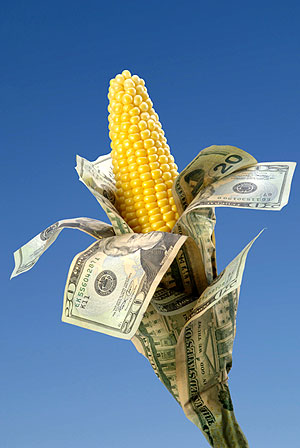 By David Kretzmann Feb 7th, 2011
By David Kretzmann Feb 7th, 2011As a lifelong vegetarian, no style of meat production is particularly appealing or justifiable to me. However, despite my herbivore bias, I still see an ethical dilemma present in current industrial meat facilities. Little respect is given to the conditions and treatment of the animals in industrial facilities. Animals rarely see the light of day for any substantial amount of time and they are raised on concrete floors; they are treated as mere products without regard for their status as living, breathing beings. The greatest crime, however, is that industrial facilities survive purely out of price floors, legal code, and other direct government subsidies that hinder competition from natural, local food systems.
A superior product in the marketplace should not require extra help from a government agency, whether it be in the form of a price guarantee for corn (the main substance fed to livestock in industrial facilities), legal code that mandates industrial farming (or heavily restricts other methods of non-industrial farming), or other government subsidies. The fact that industrial livestock facilities rely on government assistance for survival is a testament to their flawed, unnecessary, and undesirable business practices. (If they don’t require government assistance for survival, why continue providing subsidies and other competitive advantages to these corporate industrial livestock giants?) If people prefer to purchase industrial livestock meat over locally grown free range meat, there is no need for subsidies or other governmental involvement. Clearly, subsidies are needed only when a corporation or industry (such as industrial livestock producers) offers a lousy product that people won’t normally desire.
Government subsidies merely provide the illusion of cheap prices, which goes a long way in distorting the prices and actions of people in the marketplace. The fact that industrial meat is the cheapest does not mean it’s a better product or business model, particularly when you account for the government assistance needed to lower the price in the first place. Of course, it is us, the taxpayers, who are providing the subsidies, so the cost we pay for “cheap” food at the grocery store isn’t actually very cheap. We pay taxes to provide farm and grain subsidies, fund the bureaucracies who regulate and administer fines to farmers who don’t cooperate with the industrial system, among other taxpayer-funded programs.
Society is not bearing the cost of water pollution, of antibiotic resistance, of food-borne illnesses, of crop subsidies, of subsidized oil and water- of all the hidden costs to the environment and the taxpayer that make cheap food seem cheap. No thinking person will tell you they don’t care about all that. I tell them the choice is simple: You can buy honestly priced food or you can buy irresponsibly priced food. – Joel Salatin [i]Clearly the industrial food system has government tilted in its favor; its products are cheap not because of their superior taste or flavor, but because they have managed to successfully crawl into bed with government to dismantle other legitimately competitive businesses. The philosophy of the industrial food system can be summed up in this statement: if people won’t buy your lousy, nauseating product, lobby government for subsidies and other protectionist interventions to dismantle competitors who actually offer a product desirable to the public. (CONTINUE READING ARTICLE)